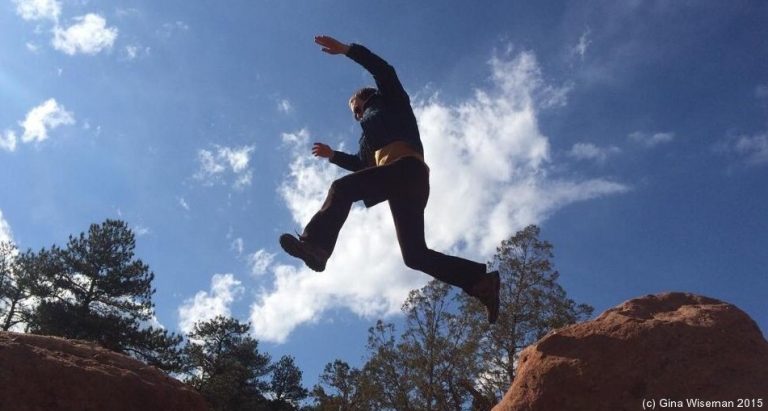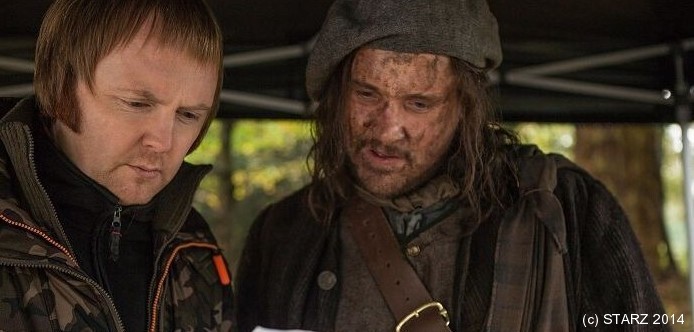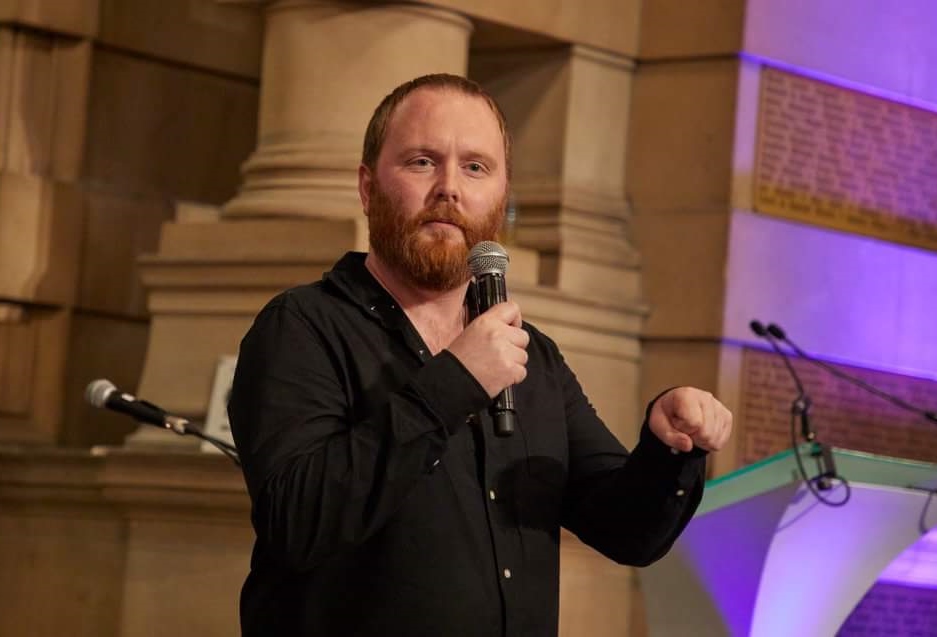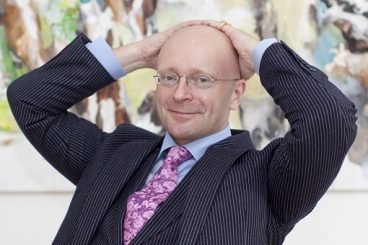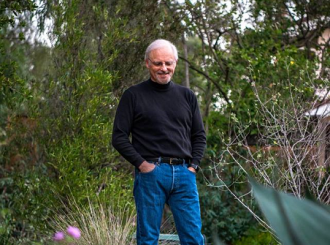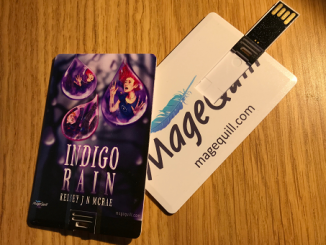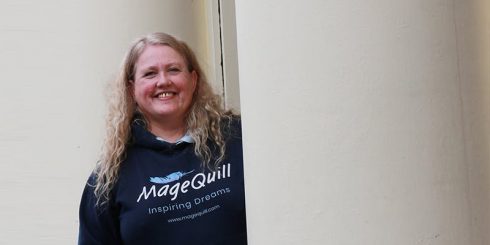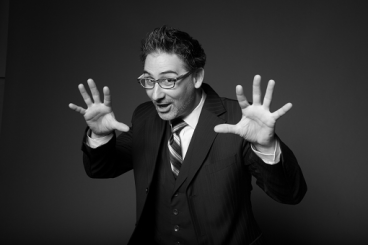Of Language and Revival: (Re)visiting the Highlands
by Swara Shukla · Published · Updated

I am taking the mantle again from my friend Swara (yes fine, I made a friend, don’t harp on about it now) because I absolutely had to chat with Àdhamh Ó Broin about all things Scottish! (No, I didn’t squeal. That was Swara.)
Basically, there is lots of Gaelic, Scottish culture, and music in here. And of course, some stories from the sets of Outlander! Adhamh is as proudly Scottish as it gets, not that I am surprised – he found both career and creativity in his culture after all (now, that has a nice ring to it).
Read for yourself. I am off to cozy up with some Gaelic.
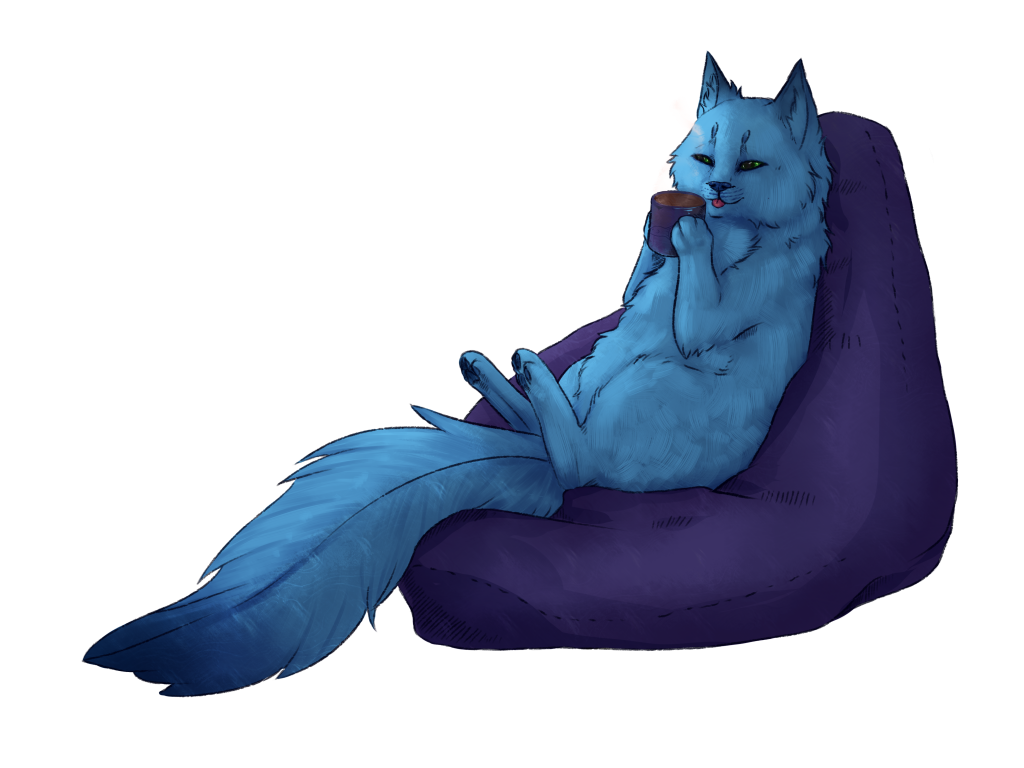
I am so very proudly Scottish and I have even got my partner (read: mouthpiece) Swara to become a self-identified Scot. Yet, we don’t know Gaelic (although if you say that to anyone, I shall deny it). It is a huge part of Scottish cultural identity, but how do you feel it figures in the day-to-day language and landscape today?
There are two ways to answer that question; and I think both ways are important.
On a national level, Gaelic is a recognized official language of Scotland, after the Gaelic Act came in over 10 years ago. It has protected the language’s official status. So nominally speaking, it is promoted by government agencies, by universities, by quangos in-charge of language funding and distributing information about Gaelic, and every business in Scotland is charged with producing a language plan to demonstrate how they’d employ the Gaelic language within the machinations of the company. So, everyone from the local council to a salmon company to a shop chain must do that. Like the co-op chain in Kyle where I am sure you prance around, Blue Cat – they have the language on the shelves. Some companies haven’t bothered at all though. On an official level, after centuries of persecution, it has been recognised as something that should be revived and should be protected.
The only problem is that, from my perspective – and this is the second-half of the question – I feel Gaelic is being revived in order to do everything English does. For example, your friend Swara here speaks Hindi – she speaks with a different mind. When you speak English, it is a separate way of thinking. There is a crossover, but they are still separate ways of thinking. When I speak Gaelic, I don’t necessarily want to talk about the exact same things that I would talk about in English. Likewise, I’m a fluent Scots speaker so I speak the Lowland Scots language. For instance, if I am in the pub on a Saturday night in Glasgow, my preferred language is Scots because it’s the local language. It’s a language of great humour and expression and banter. Football for instance is something I would prefer to discuss in Scots. With English, it’s if I want to talk about science and technology, it’s ideally kitted out for that already. Anything to do with love, landscape, home, emotional stuff, heart, and culture – I would want to do it in Gaelic. This is the idea of a natural multilingualism, bifurcated or even trifurcated psychologically, where it’s okay for languages to be like how the English idiom puts it – “horses for courses”.
With Gaelic, I feel they are trying to force it to do everything English does; they are running it along on the coat-tails of English. I feel there’s no point getting Gaelic to do what English does because English is the world’s lingua franca – the most powerful language of the world. It is the language of all digital interface and advances in science. You are never going to catch English, it has already risen into the stratosphere. So instead of forcing Gaelic to run 100 times its natural pace, I think it needs to be allowed to give expression to things it is already cut out to do until it grows stronger. That’s my perspective on it.
Of all the languages, how and why did you pick Gaelic?
It was more like Gaelic picked me. If you saw an old lady lying on the side of the street struggling to get up, your instinct would be help her. That’s what I’ve been doing with Gaelic – helping the old lady up and helping her home. The language belongs to my people – the Gaels, who are an ethno-linguistic group. You can’t really call them Scottish or Irish. Despite once being a distinct ethnic group spread across Scotland and Ireland, we are now not generally regarded as such. Part of that is because we don’t have any particularly discernable difference in skin colour or hair colour or eye colour. We just look mostly like any other white people. So, people just assume us Scots are all just the same. It’s difficult for people to get their heads around. The Anglic-speaking people with whom the Gaels have shared Scotland for the last 1500 years came from the Anglo-Saxon population that migrated to England from the continent and also moved into southern Scotland. Most Scots though do also share a heady intermixture of Norse blood which is why I have a distinctively Norse look with the red hair and all of that! The red beard is a very Norse thing – it’s a bit of a myth that we Gaels are very red-haired. We are not naturally; many people from Scotland and Ireland were and are quite dark-haired.
When I started getting into the language – my parents were not interested in anything related to music or language or culture really – my grandmother always told me I was off of Highlanders and that I was different from the Glaswegians around me. I mean I always felt comfortable here in Glasgow, but she used to tell me about my people and that I was a Gael and a Highlander, that we were MacLeods which was her own name. She passed on a smattering of the language to me. I only had the one grandparent and I inherited that identity from her. To learn the language for me was not as much learning as it was a case of reclamation. It was reclaiming the language of my ancestors and my People. Very few Gaels now will acknowledge themselves as ethnically different. They don’t see Gaelic as a locus of their cultural or ethnic identity. For me, it is important to maintain a cultural connection to my ancestry. So, learning Gaelic was more a reclamation of the language, something I had an implicit right to. The last person to speak Gaelic in my family passed away in 1938, so we are only talking 80 years which isn’t that long ago, if you imagine it before that – thousands of years of Gaelic speaking.
As a career move though – I chose it because of how passionate I became about the reclamation and how knowledgeable I had started to become in everything related to Gaelic. I haven’t studied it in university, and I don’t have a degree. The only thing I have is a higher A-grade in Gaelic. And even that I got as an adult. So, I don’t have any formal training whatsoever. But I learn by spending my time with old people, by listening to old recordings and by reading the language extensively. When I saw the advert put out in an email by the Outlander production, I knew I could absolutely do that job! In fact, there are not all that many people who would have had that exact skill-set, who’d be used to scripts, be able to work with actors, keep them engaged. But also have the relevant knowledge and the energy. That’s what convinced me I could start my own business; coming out of the first season of Outlander. It was in 2015 I kicked things off. Very interesting day that was. I started my business in the morning and my mother passed away that afternoon. Just by sheer chance, that was the way it started. I am so pleased the business is still operating now and I am still managing to stay afloat. It was a hugely pivotal day in my life.
Did you also see the market for the job because there were not many people who could do it?
There are several people who’d be able to do the job as well as I can, actually! But they tend to have university positions; researchers, scholars, professors. I was luckily able to make the jump from my pervious post.
I worked for a company called Deiseal Ltd. They adapted the teaching technique that was used to revive the Hebrew language to Scottish Gaelic via Welsh. The company was very sadly due to go under in the April of 2014. It was in August 2013 that I jumped ship to Outlander and I was able to do that because I had no academic commitments.
Now, I have watched Outlander in bits and pieces (gosh, I am shaming myself as a Scot), but I find it so awesome that you were a consultant on it. What is that process like? How do you feel Gaelic contributes to the storytelling process in Outlander?
AND – of course I have to ask if you have met any of the cast and crew, and if there are any anecdotes I should be hearing about?
My contribution to the actual storytelling is fairly limited I suppose. I was working as a language consultant, so I worked specifically on the language side of things. When I was given translations to do, I was able to contribute to the greater pastiche of the story by translating the lines in such a way as to make them culturally viable and important, as well as supporting the story. I was able to bring a layer of culture to the programme which otherwise would have been missing. As you can imagine, there is so much to Outlander that is quite fantastical. It’s a fantasy show! There was a lot of it that was pretty well-researched by the set designers and the costume designers. They did a great job. In my role, I felt that the one place we could get a completely authentic product would be the language. The challenge was of course that I was dealing with 6 guys who had never spoken the language in their lives! And I had only 4 weeks, later extended to 5, to get them up to speed before starting filming. So, I had a very short window in which to turn this around. Naturally, there are certain lines in the show that I will hear and go “oh that’s not right, they’ve swallowed that line, it’s practically upside-down!”, but these were non-native speakers and I had very little influence on what takes were used.
That influence really extended to just the lines. However, because I’m a Gael and am fluent in my language and culture, with a broad knowledge of proverbs, folk practices, native agriculture and the clan system – they would consult me on cultural and historical things as well. In all fairness to them, they had to ignore a lot of what I said in favour of continuity and the story; they were filming a TV show not a documentary. But they consulted me on a lot of things. Some of the nomenclature can be a bit incongruous but as I said, you are making good TV. You are not trying to tell the story of the Scottish Highlands, you are making a swashbuckling action romance.
Diana Gabaldon, who wrote the books, is a scientist with a very fine mind. Her research was impeccable in most things. She didn’t get the Gaelic just right all the time. But she wrote the books as an experiment, so you’ve got to give her some room there to manoeuvre. A lot of the things that involved cultural references, rituals, and history are fairly sound, and the writers of the show were able to take that precedent and work from that. Some episodes can seem quite culturally removed from the Scottish Highlands but there are many points where the atmosphere is spot-on, really quite good. So, you just take the rough with the smooth; the whole Scottish landscape, culture, history everything was woven right into the story and even if it wasn’t all correct, what it does is it gives people who watch it a starting-off point to want to learn more. I mean, English wouldn’t have been spoken whatsoever in the Highlands at that time, but without it, you wouldn’t have had a show, so being puritanical about that would have been pointless.
As a musician and songwriter, what is your creative process like? (Not that I am looking for ideas…or a change of career.)
A lot of my songwriting over the years has been in English. Mostly rock-and-roll, Americana, country, you know? I use the acoustic guitar and occasionally the piano. I am a fairly accomplished electric blues player as well. And I have got a big, gravelly, bluesy, soul voice! So, before I got back to Gaelic, I had spent my time playing in rock-and-roll bands. Playing drums, bass, guitar. Singing. That music is very much what’s in me.
Having said that, I do sing a lot in Gaelic. I sing most nights with my kids – we sit singing all the local songs from where I grew up. So, there’s always a musical narrative in terms of Gaelic in the house. In terms of music, it’s as much about preserving a tradition and continuing a tradition as it is about creating new songs. In rock-and-roll, it’s always about the new thing, the new band on the scene, about novelty, and all the new stuff we can come up with. With Gaelic music you are reinforcing a sense of who you are, who your people are, where you come from, and what your connection to the world, the land, the universe is. This is very much where the Gaelic song tradition comes from – repeating the history and the trials of your people and reinforcing your belonging to that ethno-linguistic group, which is not really how you’d put it in Gaelic, but it’s the easiest way to express it in English. I don’t do a lot of public Gaelic singing. My business is public-facing, but my musical endeavours in Gaelic are more family-oriented.
Adhamh singing “Caledonia” in Gaelic
Video credits: AJEM Edinburgh
What was your very first consultancy project like?
I had sort of started the business before I officially launched it as Àdhamh Ó Broin: Scottish Gaelic Consultancy. I suppose, in a sense, that gave me a corporate identity. I had been doing little jobs before that, invoicing as partially self-employed. As soon as I finished up Season 1 of Outlander, Diana Gabaldon asked me to write a Scottish language glossary for her book The Outlandish Companion Volume II. With the help of my wife, I went through every book of the Outlander series – Books 1 to 8 – and dredged all of the Gaelic out and all the Scots language, and wrote a glossary of that to explain all the terms, gave examples of how they’d be used and wrote commentaries. It was a very interesting job.
The first few weeks of the business were actually spent gearing up for working on Outlander Season 2 but the way it worked, I didn’t end up coming onboard at the show until the following November. For at least the first half of Season 2 – which was in France – I didn’t do as much on the project as I had anticipated so I had to try and fill that vaccuum. I realised fairly quickly that I was going to have a shortfall and was going to have to – fairly early on in the life of my business – diversify. By 2016, I realised if I didn’t do that, I would have to fold the business within 6 months to a year. But that thought never seriously crossed my mind because I was able to diversify fairly quickly into Highland tours essentially but very much from a cultural and linguistic perspective; so describing the life of the ethno-linguistic group known as the Gaels who once lived throughout the Highlands and Islands before the area became colonised and the language and culture were extirpated by the British State over the last 300-odd years.
How do you work to keep your creative flair alive every day? (Mine is sleep. My dreams are really creative.)
It’s a good question because I have so many different and diverse focuses. Sometimes a read-out for a job could be how long a piece of string is! I think what I do is that I always look for the cultural sap, cultural juice. I look for what is meaningful to my culture as part of the job. Once I find that and if I can tap into that, then it naturally inspires my own cultural and creative juices to keep bubbling. There’s a natural fuel for me, a natural inspiration in doing anything for my culture and my language. If I can tap into that, it means that my mind is like an open spring, an endless well. I become a bit like a conduit for my ancestors. So that’s a good thing. If I am on a job that doesn’t have a lot of that, I’ll be honest, I sometimes just turn down the work. It’s not a profit-heavy industry, it’s a very niche thing but what this means is that while I’m pretty broke most of the time, I very rarely get up in the morning and say, “oh I can’t stand the thought of sitting down to work!”
I think if you are able to maintain your creative streak by exposing yourselves to things that are naturally going to inspire you, then you’ll eventually find that your business becomes successful off the back of the fact that people who are hiring you always get the enthusiastic version of you, because you don’t take on jobs that don’t have an element of cultural worth about them. I think that’s how I do it – it’s constantly trying to whittle down bit by bit what my product is, what I am and what I do in terms of my business to the point that when people come to me they think “well this is the guy for the really culturally integral stuff!” Through that, it is pretty easy to maintain a creative focus.
The main thing to add to that is that I don’t feel creatively drained at the end of the day. I feel still able to go and maybe rehearse with my band or do something creative with my kids, or go somewhere and work on some of the voluntary stuff that I do. The well or the spring doesn’t really dry up because the work that I do feeds it rather than draining it.
(Copyright of all pictures lies with Adhamh.
Illustration by Josephine Molyneux-Child)

